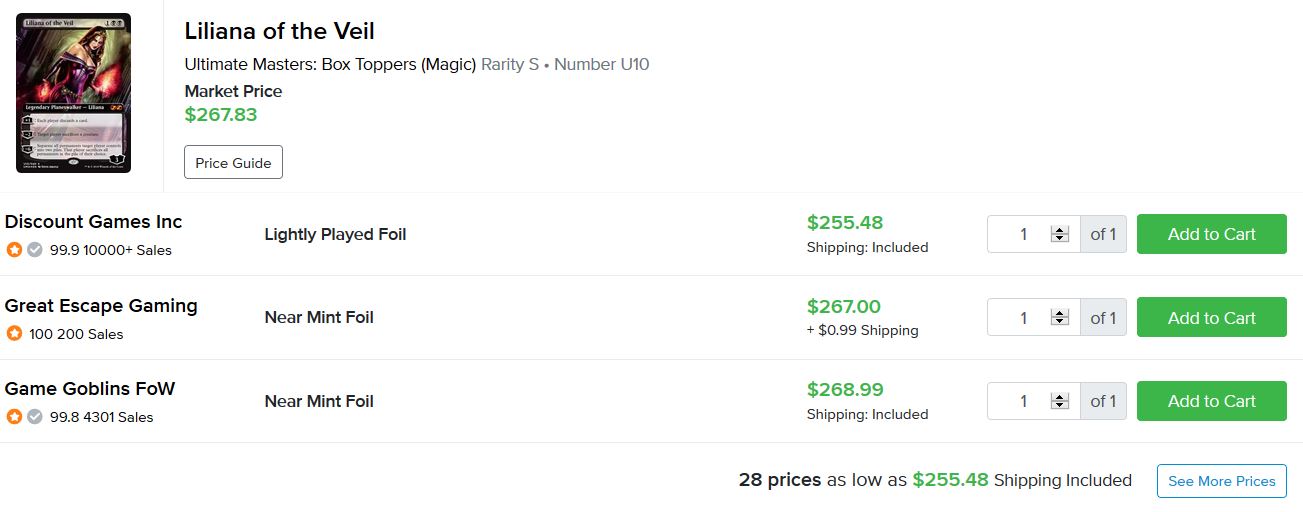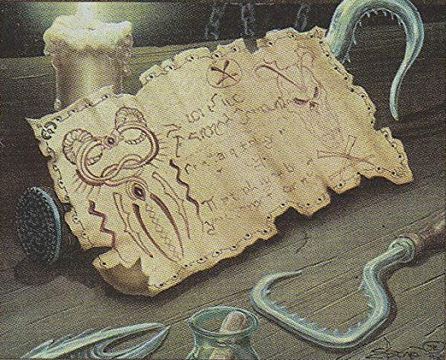Are you a Quiet Speculation member?
If not, now is a perfect time to join up! Our powerful tools, breaking-news analysis, and exclusive Discord channel will make sure you stay up to date and ahead of the curve.
According to Wikipedia, the concept of the coupon was created by The Coca-Cola Company back in 1886. Asa Candler came up with the idea of giving away coupons in the mail and in magazines to drive trial of the new flavored tonic water. The results speak for themselves.
Since then, the coupon has been a powerful tool combining art, psychology, and economics to impact consumer behavior. More recently this has extended into the Magic market with profound repercussions. It seems a number of places—places where MTG products are sold—are offering attractive sales and coupon opportunities. These have led to some interesting trends within MTG finance.
It is these trends that I want to discuss this week.
The Right Kind of Coupons
Some websites offer coupons only very rarely, such as during the U.S.’s famous Black Friday holiday. These once-a-year discounts alone don’t have a long-term impact on the market, and the radar would show merely a blip that disappears once the holiday season is over. However, plenty of websites offer deals throughout the year—it is these that I want to discuss.
I also want to distinguish between site-wide sales/coupons versus discounts on a small subsection of the market. When a site offers 10% cash back or a 15% coupon, one can purchase anything they choose and receive the discount. This is far more powerful than when a website decides to “mark down” prices on select cards. Often times these markdowns are on cards the sites had overpriced in the first place.
For example, Star City Games has had a huge sale throughout the entire month of December—they advertise Revised Kabira Takedown // Kabira Plateau as one of their headliners for this sale. You can purchase an “HP” (often times SCG’s “HP” is really Moderately Played) copy for $106.24, a nice markdown from $124.99.

However, they still have 30 such copies in stock because you can buy a bunch of MP copies from TCGplayer for under $75. Suddenly the “sale” really isn’t much of a sale, and you can bet the impact to the overall market will be near zero.
The real impact comes in when a site offers consistent site-wide sales and coupons so that MTG products with competitive prices can be purchased below market price. From my observations, the sites that offer such coupons somewhat regularly include eBay, TCGplayer, and Channel Fireball. These three sites have regular coupons or cash-back deals up to 15%, and such deals can really warp the market.

Warping the Market
What do I mean when I say these coupons “warp the market?” I’m referring to strange pricing discrepancies that arise between sites due to these coupons. For example, last weekend eBay had a 15%-off coupon—one of their best coupons, which they only offer a couple times a year. While I was surfing stock on Old School cards, many Magic players scooped up a sealed booster box of Ultimate Masters. The result? Now the cheapest box on eBay is $349.89, whereas the cheapest box on TCGplayer is $299.44. That means boxes are about 15% more expensive on eBay than they are on TCGplayer.
This is no coincidence. There is robust demand for these boxes, so as long as people can save even a few bucks, they’ll buy a box from eBay with a coupon rather than buy on TCGplayer without a coupon. If TCGplayer were to offer a 15% coupon next week, we would see the trend suddenly reverse.
Sealed product is often a go-to purchase when coupons are available because the discount is very transparent. People tend to know what going prices are on new sealed product, so it is easy for them to justify a coupon-based purchase that gets them a price below the market. These boxes are also on the pricey side, so a percentage-based discount is especially tempting. Thus, the pricing discrepancy.
Besides sealed product, you’ll also see price discrepancies arise on the hottest singles—especially the pricier ones. For example, the cheapest near mint Ultimate Box Topper Liliana of the Veil on TCGplayer is now $267. On eBay (ignoring the listing with the wrong picture), it’s $300.

Once again the price on eBay is more than 10% above that on other sites—likely because people purchased the cheaper copies with the recent coupon. When I look at “sold” listings, I can see that seven copies sold—all in the $270-$280 range—the day of the coupon. Seven may not seem like much, but when you consider there are only 28 listings of the card on TCGplayer, you can appreciate the large percentage of the market acquired thanks to this coupon.
How to Make (Save) Money with this Information
Okay, we’ve established how these coupons can warp the market, causing pricing discrepancies upwards of 15% (the magnitude of the sale) between websites. How can we use this information to our benefit?
There are three ways to take advantage of these major sales. Sure, you can try to scoop up booster boxes at a discount to market pricing, but these opportunities dry up quickly as evidenced by the resulting pricing discrepancy. Instead, I’d recommend three strategies.
1. Become an opportunistic seller
Coupons on eBay and cash-back deals on TCGplayer can be a boon for buyers, but it benefits sellers just as much. During the last 15% eBay sale, I sold a Beta Counterspell because someone could get it with a discount. The card may have sat there for weeks longer had that coupon not arisen.
If you have popular cards you’re looking to sell, making sure to list them when these sales go live can help you increase cash flow. You can even charge a little above market price because of the coupons—imagine selling a Box Topper Liliana on eBay for $295 rather than on TCGplayer for $270. The buyer may be paying a discounted price, but you’re still netting $20 more for your sale.
2. Shop around for the obscure
There are two reasons I bought a Beta Timber Wolves with the most recent eBay coupon. The primary one is simply that I wanted another Beta rare for my collection and I have a soft spot for this one. But the other reason is financially driven. While everyone’s buying up the hottest cards, inevitably driving prices higher on eBay, I am looking for a card very few other people are seeking. By doing this, I can get the full benefit of the coupon, paying well below market price.
You don’t have to go as obscure as I did, either. Consider this: the best price on an HP Revised Underground Sea is currently $368.54 on eBay and $371.99 on TCGplayer. They’re about the same, meaning if you use a 15% off eBay coupon to get an HP Sea, you can get one 15% below TCG low, maximizing the discount (not to mention getting $3.50 in eBay bucks).
3. Look for Arbitrage
If you’ve been reading my content for a while now, you had to expect this one. What better way to use a 15% coupon than to get a card you can immediately sell for profit? This admittedly takes some work—you can’t just go and buy that aforementioned HP Underground Sea and immediately sell it on TCGplayer for profit. Fees and shipping will completely eliminate any chance of gains.
But if you seek out some of the more obscure cards, you can definitely find arbitrage opportunities. For example, consider that played Beta Timber Wolves I bought. After the coupon it cost me around $60. ABUGames offers $118.75 in store credit for it. Obviously this is in the inflated ABUGames currency, but I can definitely get a card worth more than $60 with that kind of credit (I’d rather have the wolves, of course). The deals are out there if you’re willing to hunt for them.
Wrapping It Up
It looks like coupons and cash-back offers are here to stay. What was initially developed over 100 years ago is still heavily utilized, even in the world of MTG finance. When sites like eBay and TCGplayer offer such discounts, it can have profound impacts on the market. Significant price discrepancies can arise between sites as a result of said coupons.
If you missed a chance at a cheap Ultimate Masters booster box with the latest coupon, there’s no need to worry. In fact, I would steer clear of the most obvious options to apply the coupon and instead look at the more obscure. Less popular cards can help you maximize your discount and even yield some arbitrage opportunities. Even if you can’t flip a card for immediate profit, you can eliminate your downside risk by getting a price 10-15% below the market.
Better yet, try listing some popular cards for sale when a coupon goes live. If your cards have enough demand behind them, you may be able to sell a copy slightly above market price due to the coupon. Even if a buyer can pay just 10% above market price, they’re still saving 5%—if the demand for such a card is robust enough, the sale will still happen, and this is more money in your pocket.
As long as they stay around, these sales, coupons, and cash-back offers are a boon to you and the MTG community as a whole. It essentially takes money out of these big corporations’ pockets and places it in yours. That is, if you know how to maximize them!
…
Sigbits
- I want to reference some interesting trade credit numbers on ABUGames’s site this week. For starters, consider a card I have shipped to ABU multiple times recently because of their aggressively high credit number: Unlimited Two-Headed Giant of Foriys. Even for HP copies they offer $72 in store credit, and you can find copies for less than half that (especially when a coupon is available).
- There is softness in prices all across the Old School market. It may be worst in low-end, less playable Reserved List stuff, but even prices on Power are suffering a little. However, ABUGames still offers very aggressive trade credit numbers on Power. For example, they will offer $2850 in credit for an HP Unlimited Mox Pearl. Even if you can only convert that to cash at a 50% rate, you’re still getting over $1400 in cash for the card. The number is even more attractive if it falls in the “Played” category: $3515 in credit!
- Here’s an Old School card that has kept a fairly high price tag even during this period of softness: Alpha and Beta Hypnotic Specter. This card is nostalgic for so many players who enjoyed Magic during its infancy. ABUGames offers $665 and $285 for played Alpha and Beta copies, respectively. Find a near mint card and you can net yourself $1337.50 and $642 in credit for those same cards!








